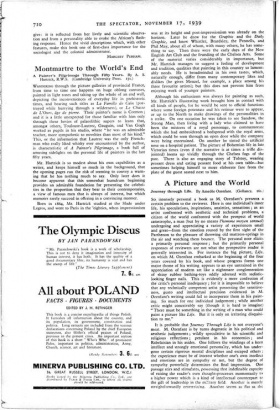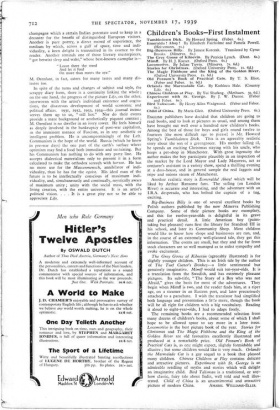A Picture and the World
Journey through Life. By Amedie Ozenfant. (Gollancz. 16s.) So intensely personal a book as M. Ozenfant's presents a certain problem to the reviewer. Here is one individual's inner life, his speculations, inspirations, anxieties, sensations ; as an artist confronted with aesthetic and technical problems, a citizen of the world confronted with the prospect of world catastrophe, a man (but by no means l'homme moyen sensuel) undergoing and appreciating a variety of experiences small and great—from the emotion roused by the first sight of the Parthenon to the pleasure of throwing old mattress-springs in the air and watching them bounce. The personal note elicits a primarily personal response ; but the primarily personal responses of reviewers are not what the nrospective reader is generally interested in. For instance the big picture, Life, on which M. Ozenfant embarked at the beginning of the four years covered by his book, and whose progress forms one major theme of his writing, appears to an eye untrained in the appreciation of modern art like a nightmare conglomeration of shiny rubber bathing-toys oddly adorned with sadistic- looking finger nails. This is evidently a mere confession of the critic's personal inadequacy ; for it is impossible to believe that any technically competent artist possessing the sensitive- ness, gusto and intellectual precision evidenced in M. Ozenfant's writing could fail to incorporate them in his paint- ing. So much for one individual judgement ; while another critic might conceivably say (though it is hard to imagine) " There must be something in the writing of a man who could paint a picture like Life. But it is only an irritating disquisi- tion to me."
It is probable that Journey Through Life is not everyone's meat. M. Ozenfant is by turns dogmatic in his political and aesthetic judgements ; wildly speculative in his scientific and religious reflections ; petulant in his economics ; and Rabelaisian in his asides. One follows the windings of a keen intellect and strongly emotional persona"ity, which has under- gone certain rigorous mental disciplines and escaped others ; the experience must be of interest whether one's own intellect and emotions are in sympathy or not, but the degree of sympathy powerfully determines the final impression. One passage stirs and stimulates, possessing that indefinable capacity of raising the reader's own thought-processes momentarily to a higher flower which is a kind of intellectual counterpart to the gift of leadership in the military field. Another is merely straightforwardly eritertainina. Another seems as flat as the
champagne which a certain Indian potentate used to keep in a decanter for the benefit of distinguished European visitors. Another is pure poetry, a direct record of experience, the medium by which, across a gulf of space, time and indi- viduality, a keen delight is transmitted in its essence to the reader. Another reminds one of those literary masterpieces, " got betwixt sleep and wake," whose best-known exemplar is-
" Leave there thy steed And let it feed
On more than meets the eye."
M. Ozenfant, in fact, caters for many tastes and many dis- tastes too.
In spite of the turns and changes of subject and style, the scrappy diary form, there is a continuity linking the whole ; on the one hand, the progress of the picture Life, on the other, interwoven with the artist's individual existence and cogita- tions, the disastrous development of world economic and political affairs. 1931, 1932, 1933, 1934—this journal intime serves them up to us, " still hot." Nor do their events provide a mere background or aesthetically piquant contrast ; M. Ozenfant is no dweller in an ivory tower. He feels himself as deeply involved in the bankruptcy of post-war capitalism, in the imminent menace of Fascism, as in any aesthetic or intelligent problem. He is uncompromisingly of the Left. Communism is the hope of the world. Russia (which he knew in pre-war days) the one part of the earth's surface where optimism may find a food both immediate and sustaining. But his Communism has nothing to do with any party line. He accepts dialectical materialism only to present it in a form calculated to make the orthodox screech with horror. He has no more use for the Massenmensch, annihilator of indi- viduality, than he has for the egoist. His ideal man of the future is to be intellectually conscious of maximum indi- viduality, and, simultaneously and continually, mystically aware of maximum unity ; unity with the social mass, with the living creation, with the entire universe. - It is an artist's political vision. . . . It is a great pity not to be able to appreciate Life.





































































 Previous page
Previous page